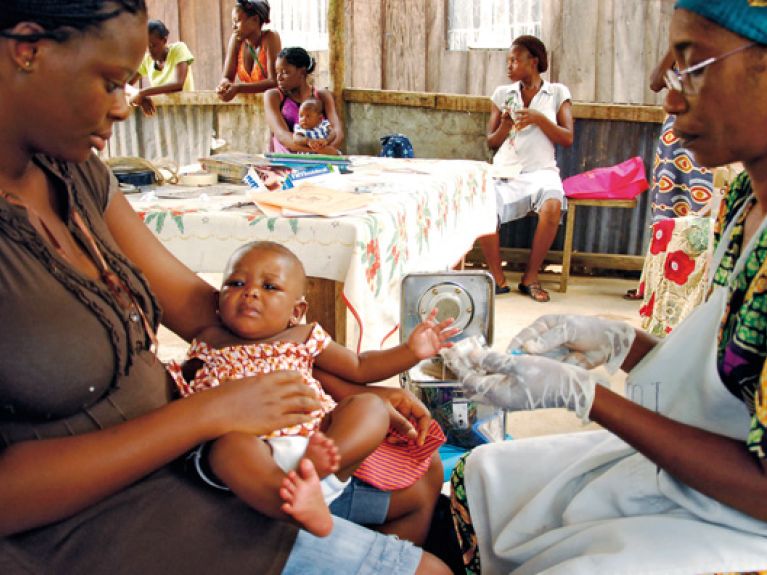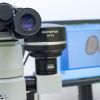“We are opening up entirely new fields of research”
The DFG’sAfrica Initiative is giving fresh impetus to research as well as promoting networking among researchers and the training of young scientists and academics. Interview with Programme Director Andreas Strecker.

Mr Strecker, in 2007 the German Research Foundation (DFG) launched its Africa Initiative. What prompted this move?
It may seem rather unusual on the face of it, but it was prompted by the centenary of the German Society for Hygiene and Microbiology (DGHM) in 2006. The Africa Initiative was then DFG President Ernst-Ludwig Winnacker’s birthday present to the DGHM. But there was, of course, a second reason behind the move: at the time Germany had very few research contacts and ties with Africa. Also, very few African countries have research funding organisations, so cooperation rarely came about.
Since 2007, 30 German-African research projects on specific infectious diseases have been funded as part of the Africa Initiative. Why is focusing on this field so important to you?
Our research interest is so-called neglected infectious diseases. These are diseases with extremely high incidence rates in Africa – in some cases much higher than, say, malaria – but which are nevertheless virtually unresearched. The pharmaceutical industry has little interest in developing the required drugs because they are unaffordable for many patients. Some of the DFG-funded projects are doing research on pathogenic worms, for example. They can cause river blindness or elephantiasis. And the so-called fever of unknown origin – probably caused by viruses or bacteria – also leads to huge health problems, with millions of people, mainly children, dying from it each year.
The Africa Initiative attaches great importance to equality of the research partners. Isn’t that something we should really take for granted?
Of course, but reality looks quite different. Before the Africa Initiative was launched, we found that African researchers working in international projects were often regarded as sample collectors and were seldom involved in the actual research work. There is a widespread prejudice that Africa lacks up-to-par research institutions. That’s just not true. An example of a well-established institution is the Albert Schweitzer Hospital in the Gabonese city of Lambaréné. The clinic, which was founded by Albert Schweitzer in 1913, is partnered with some of the DFG-funded projects. It has since been expanded into something resembling a cluster of excellence, which receives substantial government funding. And that is now attracting international donors as well. It’s a domino effect: when these funds are used to pump-prime new projects, that also leads to an improvement in the status of African researchers – and that in turn creates incentives, for young academics in particular, to embark on a career in research.
That’s another important point you’re raising about the Africa Initiative. What are the principal challenges facing young academics in Africa’s research landscape?
A major problem is that young academics go into the commodities industry or the telecommunications sector after graduating or while doing their PhD because they’re able to earn a great deal more there and are offered permanent positions. Those who want to go into research generally leave the country – or even the continent. The Africa Initiative creates an incentive that may sound banal – the prospect of a secure income. And we provide proper scientific training. In the projects we fund, young researchers learn what research is all about. Apart from the administrative side of the work, we also place emphasis on learning internationally deployed scientific methods. One of our objectives here is to get well-trained researchers or research assistants to transfer their knowledge to provincial areas, to pass it on and apply it there. What we repeatedly find is that many African researchers don’t know each other, even though they are working in the same country and often on the same research topic. There is, then, little exchange among them. That’s why the DFG organises an annual workshop to promote networking.
What incentive is there for German researchers to work in Africa or with African partners?
For German researchers, establishing any sort of contact with particular patients – and thus with specific diseases – is a highly attractive prospect. What they often find is that the African partners have a great deal of practical knowledge. That’s why we are also keen to see the development of a culture that acknowledges the contribution of African partners. In many projects, we’ve been quite successful in that respect. There’s already been a change of thinking on this point, especially among young European researchers.
What research successes are you particularly proud of?
Apart from the fact that some of the funded projects have produced high-quality publications – and, incidentally, that’s an incentive to all the researchers and institutions involved – we have succeeded in opening up what are for the DFG entirely new fields of research. The fact is, people in Africa often fall sick with so-called co-infections, in other words several diseases at the same time. One example is malaria and HIV. Such co-infections interact and give rise to entirely new symptoms. The major scientific challenge here is to gain access to as many patients as possible suffering from one and the same combination of diseases. Better networking and continuous exchange have now made that easier. That’s new ground for the DFG as well. Previously, these research topics were funded – more on epidemiological grounds – by big international foundations that are less concerned with researching biological causes. ▪
Interview: Clara Görtz
PROFILE
Dr Andreas Strecker is responsible for the German Research Foundation’s (DFG) Africa Initiative. Since 2007, the DFG has funded 30 projects and invested a total of some 25 million euros. The programme supports cooperation among German and African researchers engaged in work on neglected infectious diseases.

